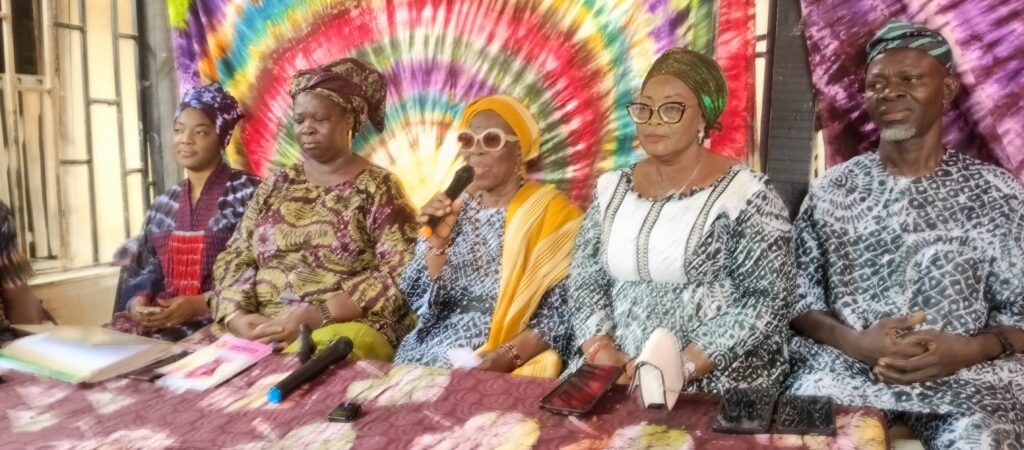Anger and outrage rippled through Abeokuta on Thursday as traders at the renowned Adire/Kampala market in Itoku, Abeokuta,Ogun State, demanded an immediate retraction and public apology from the Osun State Governor, Ademola Adeleke, over his controversial claim that the indigenous Adire fabric was “stolen” from Osun State by Egba people.
The traders, led by the Iyaloja of Kemta Adire Market, Alhaja Sadiat Akamo, said Adeleke’s statement was not only historically inaccurate but also defamatory and capable of inciting cultural discord among Yoruba people.
Governor Adeleke, in a viral video that emerged from a courtesy visit to the Chief of Staff to the President, Femi Gbajabiamila, recently, had asserted that Osun—not Ogun—was the birthplace of the Adire fabric.
Presenting a bag of Adire to Gbajabiamila, Adeleke said: “This is Adire. Osun State is the source.”
A surprised Gbajabiamila responded, “I thought it was Ogun State,” to which Adeleke replied, “No, no, no. They stole it from us.
They came to Ede, my town. You know Ede is just 15 minutes’ drive from Osogbo. But since Abeokuta is a Yoruba land, I don’t mind. I just want you to recognise and give us credit that Osogbo is the source.”
The remarks have drawn sharp criticism from Adire producers in Abeokuta, who consider the fabric a core part of their history, heritage, and identity.
Addressing a press conference at the Itoku market square in Abeokuta on Thursday, the Iyaloja of the market, Alhaja Akamo, speaking through the Babalaje of Kemta/Itoku Adire Market, Chief Michael Ogunfidodo, described the governor’s assertion as “weighty, disrespectful, and misleading.”
“For a respected governor to go public and call a people thieves—‘Ole ni won, won ji ni’ (they are thieves, they stole it)—is deeply offensive and unbecoming,” Akamo said.
“We are Yoruba people. We are Omoluabi. We are taught to be cautious and respectful in our public utterances.”
“We want the world to know that the claim is false. We are not thieves. The Egbas are hardworking people who have passed the Adire craft from generation to generation.
Governor Adeleke should retract that statement and publicly acknowledge Abeokuta’s central role in Adire heritage.”
Akamo traced the history of Adire to the Egba people of Orile Egba, which she said existed as far back as the 13th century.
According to her, Adire production was already a cultural and economic mainstay long before the formal establishment of Abeokuta in 1830.
“Adire is our pride. It is the soul of our heritage. From waxing, dyeing, tying, and printing to traditional ironing, millions of women and youths in Abeokuta depend on this craft. This is not a borrowed trade—it is our legacy,” she said.
She also cited historical figures like Madam Jojolola, the second Iyalode of Egbaland, as pioneers who elevated the Adire craft to its revered status today.
“It baffles us when someone now says it was stolen. Who stole what? Who are the ones still preserving it? Abeokuta is known across Nigeria and beyond as the home of Adire. This is not about rivalry; it is about facts,” she added.
The market leaders called on cultural historians, Yoruba elders, and leaders across the South-West to intervene and set the record straight.
“We will not be dragged into unnecessary confrontation, but we expect responsible leaders to protect our heritage and uphold the truth,” Akamo concluded.
Adire, a resist-dyed fabric traditionally produced using indigo and intricate patterns, has grown to become a symbol of Yoruba cultural identity and pride, with Abeokuta widely recognised as the centre of its commercial and historical development.
Do you want to share a story with us? Do you want to advertise with us? Do you need publicity for a product, service, or event? Contact us on WhatsApp +2348183319097 Email: platformtimes@gmail.com
We are committed to impactful investigative journalism for human interest and social justice. Your donation will help us tell more stories. Kindly donate any amount HERE




